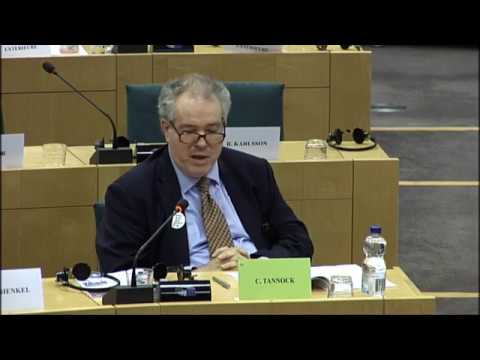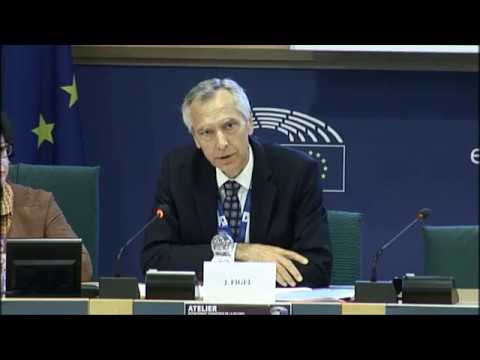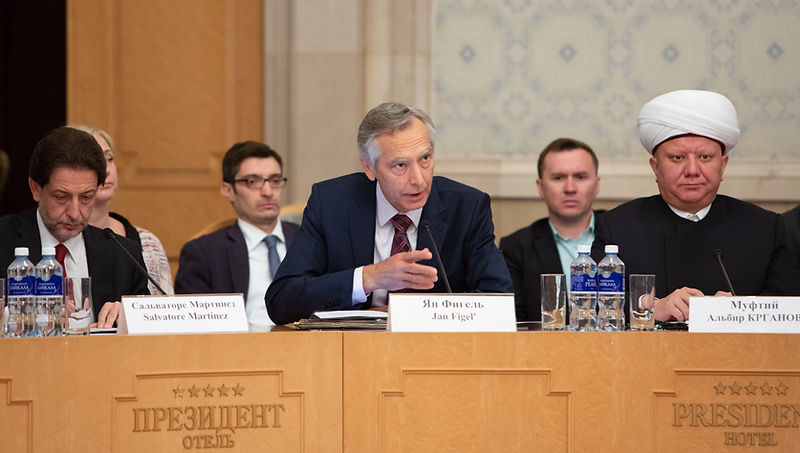Category: Jazyk
-
MEP Charles Tannock on Ján Figeľ and FoRB at the European Parliament on September 6, 2018
MEP Charles Tannock speaks about the EU Special Envoy and freedom of religion or belief, praising the work Ján Figeľ has hitherto done.
-
Európsky parlament rokuje o posilnení mandátu Jána Figeľa
Europoslanci presadzujú v návrhu uznesenia posilnenie funkcie osobitného vyslanca EÚ pre slobodu náboženstva Jána Figeľa. Dnes o tom rokoval podvýbor pre ľudské práva, ktorý je súčasťou zahraničného výboru Európskeho parlamentu. Ján Figeľ sa rokovania tiež zúčastnil. Výraznú podporu tejto funkcie presadzuje aj výročná správa tzv. medziskupiny Európskeho parlamentu, ktorá sa pravidelne zaoberá slobodou náboženského vyznania
-
-
The Special Envoy Mandate: The Litmus Test for EU Policy on Freedom of Religion or Belief
Tomorrow, the European Parliament sub-committee on human rights (DROI) will meet to discuss a draft resolution on EU Guidelines on freedom of religion or belief (FoRB) and the mandate of the Special Envoy on the promotion of freedom of religion or belief outside the EU. It’s a significant milestone, representing the culmination of a year-long
-
To Address Religious Persecution The Mechanism Of The EU Special Envoy On FoRB Needs More Teeth
On February 4, 2016, the European Parliament, as the second international institution, adopted a resolution that formally recognized the systematic mass murder of religious minorities by Daesh as genocide. The resolution, among other things, urged “the members of the UN Security Council to support a referral by the Security Council to the International Criminal Court
-
To Address Religious Persecution The Mechanism Of The EU Special Envoy On FoRB Needs More Teeth
On February 4, 2016, the European Parliament, as the second international institution, adopted a resolution that formally recognized the systematic mass murder of religious minorities by Daesh as genocide. The resolution, among other things, urged “the members of the UN Security Council to support a referral by the Security Council to the International Criminal Court
-
Dosť bolo rečí o masakrovaní Rohingov, treba konať
Masové vraždenie v Rakhinskom štáte sa začalo vyšetrovať, boli uvalené vízové zákazy. Čo treba urobiť ďalej? Po genocídach v Rwande a Srebrenici sa slová “nikdy viac” začali používať v medzinárodnej komunite ako mantra. Napriek tomu sa to opakované “nikdy viac” v Rakhinskom štáte Mjanmarska zopakovalo. Bolo 25. augusta 2017, keď armáda spustila vojenskú ofenzívu, ktorá
-
Enough talk. Let’s have action on Rohingya massacres
Inquiries were held on the mass killings in Rakhine state and some visa bans imposed; here’s what must happen next After the genocides in Rwanda and Srebrenica, the words “never again” were uttered like a mantra by many in the international community. Yet a year ago in Myanmar’s Rakhine state, “never again” happened all over
-
Ján Figeľ: Sloboda náboženstva a svedomia v juhovýchodnej Ázii je pod rastúcim tlakom
Osobitný vyslanec EÚ pre náboženskú slobodu vo svete Ján Figeľ bude spolu so spravodajcom OSN hlavným rečníkom na nadchádzajúcej konferencii o slobode náboženstva alebo viery v juhovýchodnej Ázii. V thajskom Bangkoku sa 17. až 19. augusta stretnú politickí a náboženskí predstavitelia a ľudskoprávni aktivisti z krajín tohto regiónu, ako aj predstavitelia relevantných medzinárodných organizácií. “Sloboda
-
В ЕС заявили о массовой дискриминации по религиозному признаку в мире
МОСКВА, 31 мая — РИА Новости. Свобода религиозных убеждений большей части населения планеты подвергается давлению, заявил на конференции “Религиозные свободы в мире. Путь к диалогу” спецпредставитель Евросоюза по религиозным организациям вне объединения Ян Фигель. Участниками проходящей в Москве конференции, организаторами которой выступили Межрелигиозный совет РФ, Российская ассоциация защиты религиозной свободы и Фонд Григория Богослова, стали









